Dangerous Visions: Interview: Andrew Mark Sewell
The second Dangerous Visions season on Radio 4 contained two pieces of drama based on the short stories of Ray Bradbury on consecutive Saturdays – The Illustrated Man, and The Martian […]
The second Dangerous Visions season on Radio 4 contained two pieces of drama based on the short stories of Ray Bradbury on consecutive Saturdays – The Illustrated Man, and The Martian […]
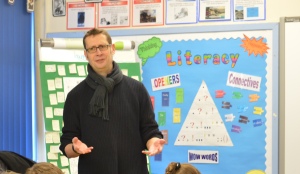 The second Dangerous Visions season on Radio 4 contained two pieces of drama based on the short stories of Ray Bradbury on consecutive Saturdays – The Illustrated Man, and The Martian Chronicles. Andrew Mark Sewell, who directed and produced the latter adaptation, is well-known to genre fans for his work championing Terry Nation’s outer space series Blake’s 7, and chatted with Paul Simpson about B7 Media’s UK-centric take on the Chronicles…
The second Dangerous Visions season on Radio 4 contained two pieces of drama based on the short stories of Ray Bradbury on consecutive Saturdays – The Illustrated Man, and The Martian Chronicles. Andrew Mark Sewell, who directed and produced the latter adaptation, is well-known to genre fans for his work championing Terry Nation’s outer space series Blake’s 7, and chatted with Paul Simpson about B7 Media’s UK-centric take on the Chronicles…a
a
How did you get involved with Dangerous Visions in the first place?
Jeremy Howe and I have been talking off and on about doing something for BBC Radio 4. We’d done the Blake’s 7 reboot and they proved very popular on BBC Radio 4 Extra. Part of me is always trying to get away from Jeremy’s first impression that we only ever do sci-fi – but I’ve actually done everything from a Shakespeare inspired rock album Sonnet 155, to the romantic feature, Mrs Palfrey at the Claremont. I’m not a one-trick pony. Blake’s 7 will haunt me to the end of days – which I can’t decide is a good or a bad thing!
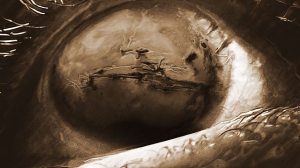 We were actually talking about something very different – another project which is still in the works – but BBC Radio 4 have one point in the year where you can pitch, so we’d put various projects together which we were interested in doing. Then a week before the deadline, Patrick Chapman, our development producer, asked whether I’d read The Martian Chronicles recently? I hadn’t read it for thirty-odd years. He’d just reread it and suggested that we should pitch it to Radio 4. It was an inspired suggestion from Patrick; once we started developing it, and talking to Richard Kurti and Bev Doyle about how we could adapt it, we realized it would be fun to do. We had something new to say about the story.
We were actually talking about something very different – another project which is still in the works – but BBC Radio 4 have one point in the year where you can pitch, so we’d put various projects together which we were interested in doing. Then a week before the deadline, Patrick Chapman, our development producer, asked whether I’d read The Martian Chronicles recently? I hadn’t read it for thirty-odd years. He’d just reread it and suggested that we should pitch it to Radio 4. It was an inspired suggestion from Patrick; once we started developing it, and talking to Richard Kurti and Bev Doyle about how we could adapt it, we realized it would be fun to do. We had something new to say about the story.
At that point, I don’t think Jeremy had decided if he was going to do a second series of Dangerous Visions; but when a few pitches, both in-house and from independents, came in, that sold him on the idea. Once we knew that we had the rights for The Martian Chronicles and BBC in-house had them for The Illustrated Man, these two productions more or less bookended the season. (I was really disappointed I didn’t get to do Do Androids Dream of Electric Sheep? It’s one of my favourites.)
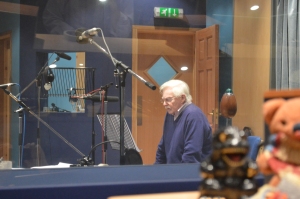 [Illustrated Man producer] Gemma Jenkins and I did talk quite a lot between us about her approach for The Illustrated Man and what we intended for The Martian Chronicles, hoping for each to reference the other. However, stylistically our approaches to radio drama are two quite different animals. I come very much from the Dirk Maggs school of radio drama: it’s cut fast, pacy, and has a more cinematic feel to it. It’s still audio drama, but the idea is to grab the audience by the throat and take them on an epic audio journey of the imagination. Both styles have their merits, but to try to incorporate an aspect of one into the other would have jarred somewhat.
[Illustrated Man producer] Gemma Jenkins and I did talk quite a lot between us about her approach for The Illustrated Man and what we intended for The Martian Chronicles, hoping for each to reference the other. However, stylistically our approaches to radio drama are two quite different animals. I come very much from the Dirk Maggs school of radio drama: it’s cut fast, pacy, and has a more cinematic feel to it. It’s still audio drama, but the idea is to grab the audience by the throat and take them on an epic audio journey of the imagination. Both styles have their merits, but to try to incorporate an aspect of one into the other would have jarred somewhat.
Bev, Richard and I decided very early on that we weren’t going to go for a truly American representation of The Martian Chronicles. It’s a classic, thinly-veiled allegory of colonisation; it’s also a commentary on the European conquest of America: the Martians in Bradbury’s original book are in effect the native Indians of North America. He just transplanted everything the colonialists did to the native Indians, made a fable out of it and stuck it on Mars. It’s a story that has been played out time and again throughout history.
While it’s a fable, we wanted to root it within our world; make it a realistic fable, if you like, working on the premise that perhaps in another ‘parallel’ universe, Mars is habitable, there were real Martians, and so forth. It’s sixty-four years since Bradbury wrote the original collection of short stories that make-up The Martian Chronicles – we know so much about Mars now that he didn’t know then. But as a commentary on our own Earth history, it’s an extraordinary piece of prophetic literature. To bring it into contemporary relevance and further engage with a British audience, which is primarily who we’re making it for, that’s why we took the decisions we did and opted for a more UK-centric cast. I think it works.
Once you accept it’s a fable, you have to decide if you present it as 1950s retro science fiction, or do you say, ‘it’s an alternate view, but we’ll tell it as if it’s in the modern era of space exploration’? Our logic was that you’ve got NASA, but also the European Space Agency, who are doing a lot of space exploration stuff; who’s to say in fifty years’ time European exploration of space isn’t on an equal footing with that of America? You’ve already got the International Space Station – so that was my/our justification for giving it a British makeover. (We have got a couple of American voices, but they’re actually Canadian!) I thought the Radio Times reviewer summed it up well when she said, “There is a timely relevance in Bradbury’s portrayal of ‘foreigners’ colonising someone else’s homeland.” This is to all extent and purposes a period piece set in the future.
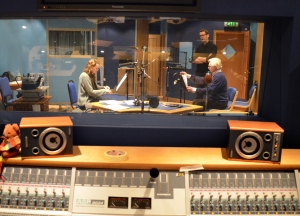 The Martian Chronicles stories read as a whole have an impetus to them that the individual stories may not, and that comes across in your version. You had a lot of stories to choose from – after all, the Americans were able to make a miniseries from it and didn’t cover all of it…
The Martian Chronicles stories read as a whole have an impetus to them that the individual stories may not, and that comes across in your version. You had a lot of stories to choose from – after all, the Americans were able to make a miniseries from it and didn’t cover all of it…
I haven’t watched that mini-series since it was broadcast, and I purposely didn’t watch it again. I wanted it to be a very distant memory and not influence what we were doing.
It was very simple: we had an hour’s drama to do, so it was impossible to adapt the whole book. It’s a series of disparate stories, and while they’re sort of interconnected, they are still individual stories, so part of the challenge was to find a throughline. That was why we chose “—And the Moon Be Still as Bright”, “The Off Season”, “The Long Years” and “The Million-Year Picnic”. The character of Wilder or his crewmembers actually appear in several of the stories, so we decided that Wilder could be our anchor and narrator. I always want to avoid a Philip Marlowe-style first person narrator, because there’s a real danger of that taking your audience out of the actual story. The framing device we came up with was that Wilder was being tried for supposed crimes, and not toeing the official line.
The other thing I wanted to get away from is that there’s always a danger if you represent the aliens, you get into an “alien of the week” kind of scenario, which can be quite hokey. We really wanted to have that sense of Ghosts of Martians Past, so there was a hint of the civilisation that was, but we don’t ever meet the Martians. They pervade the entire drama, but we never give them a physical voice. I just thought that had a more unsettling and powerful impact on the characters and the unfolding story. The fact that humankind has unwittingly wiped out the entire Martian civilisation is also the key motivation behind Spender’s actions and how Wilder ultimately comes round to realizing that she was actually right. However, he had a job to do and he did it, but he forever lived with that guilt, and in a way was attempting to right the wrongs that had been committed, and predicted by Spender. Not that he was ever justifying what Spender did, but he absolutely sympathised with her reasons for doing it.
As soon as I heard Wilder talking to the teacher taking the kids to the planet, I could see how it was going to end, with one of the touchstones of the story…
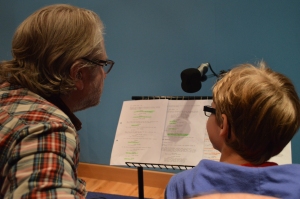 We had quite a debate about that one. We opted to start with young Wilder fishing with his father. The boy, young Wilder, watching the astronaut burning up on re-entry, like a blazing white star, is actually taken from The Illustrated Man short story ‘Kaleidoscope’, but in terms of radio, unless you’re doing that as a voiceover and therefore explaining it, it doesn’t work dramatically. You don’t have the same impact, or the effects stimulus to sell it to the audience, so that’s why we decided to up the ante and actually have it as the space shuttle exploding. (Our original idea was to take an aspect of that scene and include it in The Illustrated Man, to tie the two productions together, but because they were stylistically quite different, we decided against it.)
We had quite a debate about that one. We opted to start with young Wilder fishing with his father. The boy, young Wilder, watching the astronaut burning up on re-entry, like a blazing white star, is actually taken from The Illustrated Man short story ‘Kaleidoscope’, but in terms of radio, unless you’re doing that as a voiceover and therefore explaining it, it doesn’t work dramatically. You don’t have the same impact, or the effects stimulus to sell it to the audience, so that’s why we decided to up the ante and actually have it as the space shuttle exploding. (Our original idea was to take an aspect of that scene and include it in The Illustrated Man, to tie the two productions together, but because they were stylistically quite different, we decided against it.)
There may be some Ray Bradbury purists who object greatly to the way we’ve approached it because we have given it a reimagining… I’m getting a bit of a track record in that department! My engagement with Blake’s 7 was that I felt its themes were timeless; the original series is very dated now – but that said I think Big Finish has done a great job with the Classics in recapturing that era – but personally I’m not interested in looking back. I’m interested in making something that appeals to today’s audience; if I can take something that has been made in the past – 20, 30, 40 years ago – and give it a new, modern twist and appeal without losing the essence of its essential DNA that everyone loved when it first came out, there’s nothing wrong in doing that.
I think The Martian Chronicles was always a case of, ‘how do we make this relevant to today’s society, without losing the essence that is Bradbury?’ I’m very proud of what we’ve done: we’ve got a great team. It’s a real team effort; it’s all about the cast, the writing, the sound design. The whole package.
In one of the interviews we did with Derek Jacobi, that’s up on the BBC website, he was talking about the importance of audio directors. A director can cut it together in his head during recording and know what he’s going to get out of it. It’s true to say that the actors have to put a lot of faith in the director. What you’re recording and what you do in post are often two completely different things, and you can often get a wrong sense of what the drama is going to be when you’re just listening to it cold in a recording studio. It’s the same as with filming – you might have a great script, cast, etc., but it can rise or fall in the edit.
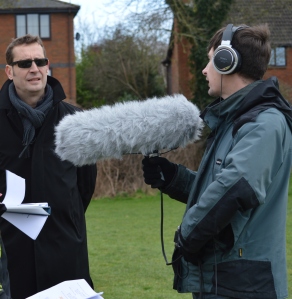 As William Goldman used to say, the starting point is always the script, the script, the script – so very true. But equally there are so many different points where you can screw it up: the script is the first and most obvious one, got to get that right; casting’s the next; the actual filming/recording is the next; and then post-production. Many an editor has saved a production! Alistair Lock and I have known each other for a long time, and worked closely together on the audio side of stuff since 2006 when we started doing the Blake’s 7 audio reboot. We’ve established a nice shorthand between each other; we know each other’s foibles. It all pays dividends in the end.
As William Goldman used to say, the starting point is always the script, the script, the script – so very true. But equally there are so many different points where you can screw it up: the script is the first and most obvious one, got to get that right; casting’s the next; the actual filming/recording is the next; and then post-production. Many an editor has saved a production! Alistair Lock and I have known each other for a long time, and worked closely together on the audio side of stuff since 2006 when we started doing the Blake’s 7 audio reboot. We’ve established a nice shorthand between each other; we know each other’s foibles. It all pays dividends in the end.
A lot of radio drama uses stock music – we don’t, ever. It’s always original music. Which can often be quite a challenge since there’s little money in the budget! We were lucky to get Imran Ahmad who did an original score, and what I love about his music is that he has a very cinematic style, but also because he uses a lot of Indian instruments in his orchestrations, they have an otherworldly feel to them, which I think is why his music works so well with this particular story – it has a haunting quality. Music should be there to punctuate and underpin a dramatic moment; it should never intrude. It should be seamless, but not remove the audience from the drama as they think ‘that’s really nice music’. If that happens, then you’ve failed. Nowadays too many dramas are overwhelmed by loud and intrusive incidental music. I think we got the balance just about right.
You got a very strong cast – in fact across the whole season there’s an incredible cast, with Iain Glen and James Purefoy on the other plays. You have Derek Jacobi, Hayley Atwell – were you writing and producing round hoping to have them?
 I had Jacobi in mind pretty much from the outset. I didn’t allow that to influence the way the adaptation took shape; I wanted the guys to write Bradbury’s characters as they saw them out of the script meetings that we had. I don’t like to load the dice for the writers, so they’re pressured to write for the particular actor; some do, but that’s not how I work. It was a question of once we got the script right, that’s when we really started to think about the casting.
I had Jacobi in mind pretty much from the outset. I didn’t allow that to influence the way the adaptation took shape; I wanted the guys to write Bradbury’s characters as they saw them out of the script meetings that we had. I don’t like to load the dice for the writers, so they’re pressured to write for the particular actor; some do, but that’s not how I work. It was a question of once we got the script right, that’s when we really started to think about the casting.
I’ve always wanted to work with Hayley; it’s actually the third time I’ve worked with Zoë Tapper – the first was when I produced Mrs Palfrey of Claremont, one of her very early films, and then we worked together again on the Blake’s 7 story Escape Velocity, so we have a good relationship and trust each other. I’ve known John Altman since EastEnders; Dean Harris and I have also known each other for more years than I care to remember, and he was, of course, my Vila in Blake’s 7. We have a bit of an unofficial rep company, and then we invite wonderful people like Derek Jacobi, Hayley Atwell and Anna Madeley into the fold. I’ve been quite spoilt with the brilliant actors we’ve been able to attract to our productions.
I didn’t want to go down the American voice route because while some actors can do very convincing American accent, others, less so. I thought let’s play to the strengths of the individual actors and their own natural accents. Derek has such a distinctive voice, as has Hayley, and Mark Lewis Jones is brilliantly and distinctively Welsh. I did ask Zoë to put on an accent, but then I was, in part, getting her to channel her performance as Nell Gwyn in Stage Beauty. I think her ‘chili dog stand’ scenes with John Altman work brilliantly. They really fired off each other and their comic timing is spot on.
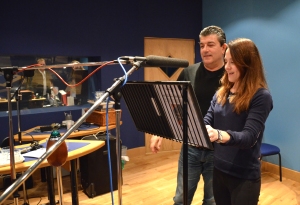 With different regional accents it’s also easier for the audience to differentiate between each character; they’re obviously distinctive in the way each character is written, but tonally the actors can imbue it with their own personality and their own voice patterns – and therefore can concentrate on being the character, rather than ‘we’re doing this accent, and I’ve got to keep this accent consistent’. With the recording always done at a breakneck speed I’m always keen to remove any obstacles that might impact on an actor’s performance.
With different regional accents it’s also easier for the audience to differentiate between each character; they’re obviously distinctive in the way each character is written, but tonally the actors can imbue it with their own personality and their own voice patterns – and therefore can concentrate on being the character, rather than ‘we’re doing this accent, and I’ve got to keep this accent consistent’. With the recording always done at a breakneck speed I’m always keen to remove any obstacles that might impact on an actor’s performance.
There’s potential for a sequel…
Yes, I sure there could be. You could give a different perspective on it. I think, though, if you went back and did The Martian Chronicles in its entirety, you would end up having to represent the Martians somehow, and that’s not something I’m terribly keen on. In an ideal world we would have liked to have done the adaptation as two sixty minute dramas. The first sixty minutes would probably have focused entirely on the various expeditions to Mars, and the concluding sixty on the actual colonisation.
Or do it from their perspective…
Yes but this is where I always have a problem where you are representing aliens and they’re speaking English – it suddenly becomes, they’re humans but they’re aliens, whereas something like Jack Finney’s The Body Snatchers, that’s about taking over the human body and inhabiting it. That’s much creepier – it’s the alien within us battling humanity.
 Dangerous Visions: The Martian Chronicles can be accessed here
Dangerous Visions: The Martian Chronicles can be accessed here
And click here for our interview with BBC Commissioning Editor Jeremy Howe
And here for our interview with writers Richard Kurti and Bev Doyle
3 Comments »